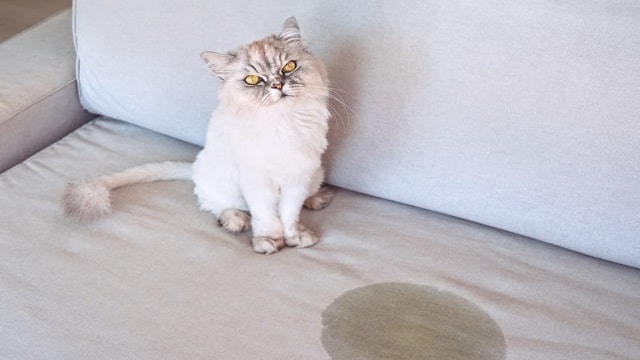When cats urinate outside their litter box, it may be due to internal stress due to emotional disorders or health problems.
When animals are small, they are trained in certain habits such as urinating in a specific place, drinking from their own bowls or sleeping in a specific place in the home. In the case of urinating in inappropriate or uncontrolled areas, especially in felines that do not usually leave the house, it is a problem that owners face and that has a background derived from different situations, such as, for example, the birth of a new baby, a change of home or some illness.
Why does my pet do its business where it shouldn’t?
Cats usually urinate inside their litter box from day one. The fact that our pet does its business outside of it can be due to different causes. Blanca Caballero, a veterinarian, assures that the procedure must start from ” ruling out a possible organic pathology. Medical factors are very important in this type of problem. For example, processes with pain (pain when urinating or when acquiring the posture to do so), gastrointestinal processes (diarrhea, constipation), or other endocrine problems such as excessive urination or polydipsia, that is, drinking more water than normal, can lead to inappropriate urination. Therefore, it is necessary to evaluate the cat’s health .”
We must differentiate between marking and inappropriate defecation.
In the case of inappropriate urination, once marking has been ruled out, it is due to “Conflicts between cats when they interact with others, an aversion to their things, such as the food tray, because they do not like the smell and/or location, as a consequence of some punishment from their owners…”, says Caballero.
Treatment when the feline pees inappropriately
The most common treatments are those applied to cats when they urinate inappropriately due to a change in the animal’s behavior, such as stress, since for organic pathologies each case would have a specific treatment. For any of them, the dedication and collaboration of the owners is very important.
– Pharmacological treatment: A prescription from a veterinarian is essential. In some cases, the administration of drugs with anxiolytic properties (for depression or anxiety) is necessary.
– Use of synthetic feline pheromones. They have a calming effect on cats. These substances are natural products that do not interfere with other medications. They are very easy to use (they are sold in the form of a diffuser). They should be placed in the place where the cat feels most comfortable.
– Encourage the cat to use the litter box again. To do this, we will prevent the cat from being bothered again when it uses it. This is common in houses where two or more cats live together. To do this, we will place a bell on the cat that is “bothering” so that the one that is “bothered” knows of its presence and is not surprised.
Preventing pet pee
To prevent our pet from peeing at home, the ideal is to control these aspects:
– Suitability of the litter box: Place it in a quiet place with easy access for the animal. Do not place it near electrical appliances or busy areas, and far from the resting area, feeders and drinkers. The litter box should be uncovered, not too high, without edges and with a suitable size so that the cat can enter and move around in it easily. Automatic litter boxes that clean themselves are not recommended as they do not cover all the needs of cats. In the case of litter, avoid scented litter or adding fragrances to it. Clumping litter is preferred by cats, but this does not mean that there are cats that prefer other textures or materials. The amount of litter that we put in is also important. The cat should be able to dig in it without touching the plastic on the floor. We will put in about 4-6cm thick litter.
– Other measures: If the cat ever urinates and/or defecates outside of its litter box, it is important to avoid any form of punishment. It is ineffective and can even make things worse by creating a defensive reaction in the cat. Make the soiled areas less attractive to the cat. Place a plastic sheet in the area and if this is not enough, place an object underneath to make it uncomfortable and unstable.
These treatments, together with good animal training, would be the key to preventing cats from urinating in inappropriate places. However, if this happens due to psychological problems, there is no need to panic. Animals, like humans, suffer situations that cause changes in their physiology.
